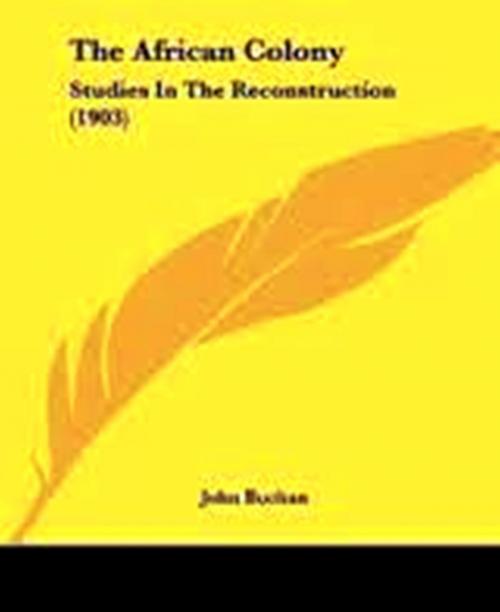| Author: | John Buchan | ISBN: | 1230000144578 |
| Publisher: | WDS Publishing | Publication: | June 23, 2013 |
| Imprint: | Language: | English |
| Author: | John Buchan |
| ISBN: | 1230000144578 |
| Publisher: | WDS Publishing |
| Publication: | June 23, 2013 |
| Imprint: | |
| Language: | English |
On the last day of May 1902 the signature at Pretoria of the conditions of peace brought to an end a war which had lasted for nearly three years, and had among other things destroyed a government, dissolved a society, and laid waste a country. In those last months of fighting some progress had been made with the reconstruction—at least with that not unimportant branch of it which is concerned with the machinery of government. A working administration had been put together, new ordinances in the form of proclamations had been issued, departments had been created and the chief appointments made, the gold industry was beginning to set its house in order, refugees were returning, and already political theories were being mooted and future parties foreshadowed. But it is from the conclusion of peace that the work of resettlement may fairly be taken to commence. Before that date the restrictions of war limited all civil activity; not till the shackles were removed and the civil power left in sole possession does a fair field appear either for approval or criticism.
[Pg x] It is not my purpose to write the history of the reconstruction. The work is still in process, and a decade later it may be formally completed. Fifty years hence it may be possible to look back and discriminate on its success or failure. The history when it is written will be an interesting book. It will among other matters deal with the work of repatriation, one of the most curious and quixotic burdens ever borne by a nation, and one, I believe, to which no real parallel can be found. It will concern itself with the slow and difficult transference from military to civil government, the renascence of the common law, the first revival of trade and industry, the restitution of prisoners, and the return of refugees—all matters of interest and novel precedents in our history. It will recognise more clearly than is at present possible the problems which faced South Africa at the time, and it will be in the happy position of judging from the high standpoint of accomplished fact. But in the meantime, when we have seen barely eighteen months of reconstruction, history is out of the question. Yet even in the stress of work it is often sound policy for a man to halt for a moment and collect his thoughts. There must be some diagnosis of the problem before him, the end to which his work is directed, the conditions under which he labours. While it is useless to tell the story of a task before it is done, it is often politic to re-examine the difficulties and to get the mind clear as to what the object of all this strife and expense of money and energy may be. Ideals are all very well in their way, but they are apt to become [Pg xi] very dim lamps unless often replenished from the world of facts and trimmed and adjusted by wholesome criticism.
Such a modest diagnosis is the aim of the present work. I have tried in the main to state as clearly as I could the outstanding problems of South African politics as they appear to one observer. I say “in the main,” because I am aware that I have been frequently led against my intention to express an opinion on more than one such problem, and in several cases to suggest a policy. I can only plead that it is almost impossible to keep a statement of a case uncoloured by one’s own view of the solution, and that it is better to give frankly a judgment, however worthless, than to allow a bias to influence insensibly the presentation of facts. For such views, which are my own, I claim no value; for facts, in so far as they are facts, I hope I may beg some little attention. They are the fruit of first-hand, and, I trust, honest observation. Every statement of a case is, indeed, a personal one, representing the writer’s own estimate rather than objective truth, but in all likelihood it is several degrees nearer the truth than the same writer’s policies or prophecies. South Africa has been in the world’s eye for half a century, and in the last few years her problems have been so complex that it has been difficult to separate the permanent from the transitory, or to look beyond the mass of local difficulties to the abiding needs of the sub-continent as a whole. Colonial opinion has been neglected at [Pg xii] home; English opinion has been misunderstood in the colonies. It may be of interest to try to estimate her chief needs and to understand her thoughts, for it is only thus that we can forecast that future which she and she alone must make for herself.
On the last day of May 1902 the signature at Pretoria of the conditions of peace brought to an end a war which had lasted for nearly three years, and had among other things destroyed a government, dissolved a society, and laid waste a country. In those last months of fighting some progress had been made with the reconstruction—at least with that not unimportant branch of it which is concerned with the machinery of government. A working administration had been put together, new ordinances in the form of proclamations had been issued, departments had been created and the chief appointments made, the gold industry was beginning to set its house in order, refugees were returning, and already political theories were being mooted and future parties foreshadowed. But it is from the conclusion of peace that the work of resettlement may fairly be taken to commence. Before that date the restrictions of war limited all civil activity; not till the shackles were removed and the civil power left in sole possession does a fair field appear either for approval or criticism.
[Pg x] It is not my purpose to write the history of the reconstruction. The work is still in process, and a decade later it may be formally completed. Fifty years hence it may be possible to look back and discriminate on its success or failure. The history when it is written will be an interesting book. It will among other matters deal with the work of repatriation, one of the most curious and quixotic burdens ever borne by a nation, and one, I believe, to which no real parallel can be found. It will concern itself with the slow and difficult transference from military to civil government, the renascence of the common law, the first revival of trade and industry, the restitution of prisoners, and the return of refugees—all matters of interest and novel precedents in our history. It will recognise more clearly than is at present possible the problems which faced South Africa at the time, and it will be in the happy position of judging from the high standpoint of accomplished fact. But in the meantime, when we have seen barely eighteen months of reconstruction, history is out of the question. Yet even in the stress of work it is often sound policy for a man to halt for a moment and collect his thoughts. There must be some diagnosis of the problem before him, the end to which his work is directed, the conditions under which he labours. While it is useless to tell the story of a task before it is done, it is often politic to re-examine the difficulties and to get the mind clear as to what the object of all this strife and expense of money and energy may be. Ideals are all very well in their way, but they are apt to become [Pg xi] very dim lamps unless often replenished from the world of facts and trimmed and adjusted by wholesome criticism.
Such a modest diagnosis is the aim of the present work. I have tried in the main to state as clearly as I could the outstanding problems of South African politics as they appear to one observer. I say “in the main,” because I am aware that I have been frequently led against my intention to express an opinion on more than one such problem, and in several cases to suggest a policy. I can only plead that it is almost impossible to keep a statement of a case uncoloured by one’s own view of the solution, and that it is better to give frankly a judgment, however worthless, than to allow a bias to influence insensibly the presentation of facts. For such views, which are my own, I claim no value; for facts, in so far as they are facts, I hope I may beg some little attention. They are the fruit of first-hand, and, I trust, honest observation. Every statement of a case is, indeed, a personal one, representing the writer’s own estimate rather than objective truth, but in all likelihood it is several degrees nearer the truth than the same writer’s policies or prophecies. South Africa has been in the world’s eye for half a century, and in the last few years her problems have been so complex that it has been difficult to separate the permanent from the transitory, or to look beyond the mass of local difficulties to the abiding needs of the sub-continent as a whole. Colonial opinion has been neglected at [Pg xii] home; English opinion has been misunderstood in the colonies. It may be of interest to try to estimate her chief needs and to understand her thoughts, for it is only thus that we can forecast that future which she and she alone must make for herself.















